Expert Copper Repiping Services in San Diego
Old pipes can cause leaks, low water pressure, and corrosion. Our team replaces and installs copper pipes efficiently. We keep your home plumbing safe and reliable.
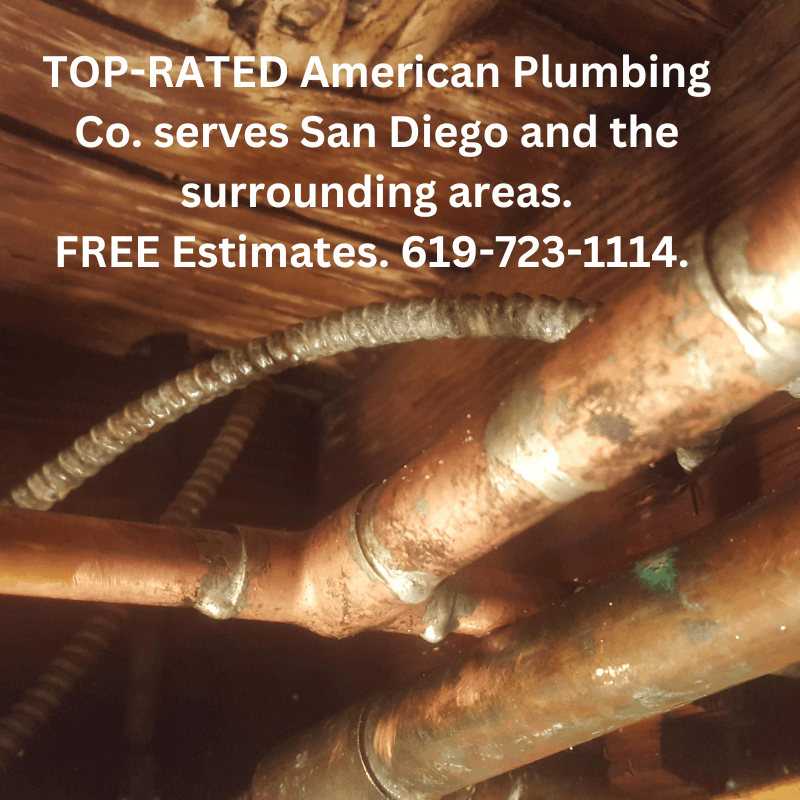
Trusted Copper Repiping for Safe and Strong Plumbing
Aging pipes create leaks and water quality problems. Our Copper Repiping Services in San Diego provide durable solutions to restore your home’s plumbing.
Whole house repipe experts handle every line carefully. We replace old pipes to prevent leaks and corrosion. One homeowner called us after noticing repeated leaks in multiple bathrooms. Our team completed the full house repipe quickly and safely.
Old pipe replacement service improves water flow and reduces maintenance issues. We remove outdated materials and install new copper lines with precision. Many clients combine this service with Water Pressure Regulator Installation Services in San Diego for optimal water performance.
Copper plumbing installation is done using modern techniques and proper fittings. Our team ensures all joints are secure and pipes last for decades. This protects your home and gives peace of mind.
Low pressure repiping solution addresses weak flow issues caused by corroded or narrowed pipes. We check every line and install new copper piping to restore steady pressure.
Pipe corrosion repair San Diego prevents leaks, water damage, and costly repairs. Our techs inspect each section and replace affected areas, ensuring long-term reliability.
Choosing American Plumbing Co | Plumber in San Diego guarantees expert repiping with safe, clean, and professional service.
Trusted Copper Plumbing Experts in San Diego
Old and corroded pipes can disrupt your home quickly. Our team provides expert service for whole house repipes, corrosion repair, and low pressure solutions.
Whole house repipe experts replace worn pipes efficiently. Old pipe replacement service ensures your plumbing functions safely. Many homeowners trust our copper plumbing installation for durable and reliable results.
Low pressure repiping solution restores steady water flow. Our team measures and tests water pressure to optimize each system. Pipe corrosion repair San Diego protects homes from leaks and damage, avoiding costly repairs later.
We stand out for professional workmanship, clear communication, and precise installation. Choosing American Plumbing Co | Plumber in San Diego ensures long-lasting copper repiping that keeps your plumbing safe and reliable.
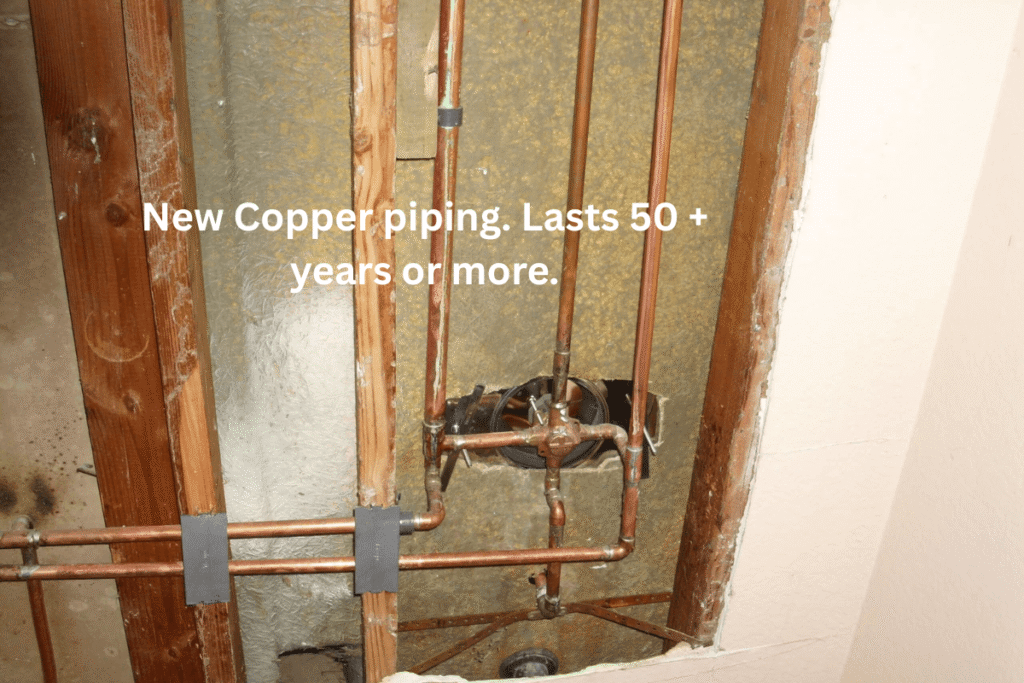
Our Services
Copper Repiping Services in San Diego
Replace old pipes with durable copper plumbing to restore water flow and prevent leaks.
Water Pressure Regulator Installation Services
Install regulators to maintain proper water pressure and prevent pipe stress.
Emergency Plumber Services in San Diego
Rapid response for sudden plumbing issues to protect your home.
Leak Repair Services in San Diego
Fix leaks quickly to protect your home from water damage with expert care.
Water Heater Repair and Installation Service
Repair or install water heaters safely to restore warm water efficiently.
Shut Off Valve Repair Services in San Diego
Repair or replace valves to control water flow and prevent leaks.
Toilet Repair Services in San Diego
Repair leaks, clogs, and flush problems quickly to maintain bathroom function.
Drain Cleaning Services in San Diego
Clear clogged drains efficiently to restore water flow and prevent backups.
Drain Repair Services in San Diego
Repair damaged drains safely to prevent leaks and water damage.
FAQs
What is a whole house repipe?
Replacing all plumbing lines in your home to ensure safety and prevent leaks.
Can you replace old pipes quickly?
Yes our old pipe replacement service restores water flow and prevents future problems.
Do you install copper plumbing?
Yes we provide precise copper plumbing installation for long-lasting results.
Can you fix low water pressure?
Yes our low pressure repiping solution restores steady flow throughout your home.
Do you repair corroded pipes?
Yes our pipe corrosion repair San Diego service replaces damaged sections to prevent leaks.
Copper Repiping San Diego: Fix Leaks and Improve Pressure
If your home has rusty water, low pressure, or recurring leaks, it’s time to consider a copper repipe. At American Plumbing Co. | Plumber in San Diego, we provide expert copper repiping for homes. Backed by 5-Star Reviews and trusted across San Diego, we’re the team to call when it’s time to repipe with confidence.
With over 40 years of experience, we replace old under-slab lines with durable copper piping for stronger water flow and long-lasting reliability.
Why Older San Diego Homes Need Copper Repiping

In San Diego, most homes built before the mid-1990s have under the slab copper or polybutylene (Quest) or early-generation PEX piping. These materials degrade quickly in our region’s hard water and coastal air, leading to pinhole leaks, rusty water, and frequent pressure fluctuations.
We’ve repiped homes across neighborhoods like Clairemont and Chula Vista, where pipes failed early even after leak repairs. New Copper solves the root of the issue for 40-50 years:
- Hard water resistant — Copper stands up to scale, unlike PEX.
- Corrosion-proof — No rust, no buildup, no flakes in your tap
- Stable pressure — No more surging water or uneven faucet flow
- Better longevity — A proper copper repipe lasts for years or more, with fewer emergency repairs.
Copper isn’t a trend. It’s what lasts
Signs You Need a Repipe in San Diego?
Most homeowners in San Diego are unaware that they need a full repipe until the damage is already done. Pipe leaks, weak pressure, and rusty water are just symptoms of a larger issue. Here’s how to spot the real problem before it costs you thousands in repairs:
1. You're Fixing Leaks Every Year
If you’ve experienced more than one leak in the past 12 months, especially from PEX or old Quest plastic piping, your plumbing system Leaks may not be isolated. It’s failing. Temporary repairs won’t hold forever.
2. Water Pressure Drops Without Warning
Inconsistent or low water pressure typically indicates corrosion or mineral buildup within old copper pipes. The issue won’t clear up with a new low-flow showerhead..
3. Your House Was Built Before the 1990s
Most homes built before 1990 used under-the-slab or plastic piping (Quest plastic piping), which degrades faster than modern copper piping. If you’re seeing signs and your house is approaching 40 years old, don’t ignore it.
4. Discolored, Metallic-Tasting Water
Is brown or yellow water coming from the taps? That’s internal pipe corrosion. If you’ve ruled out the water heater, it’s the pipe walls themselves flaking into your water.
5. Your Slab Has Been Jackhammered Before
Have you already gone through a slab leak repair? That’s a warning shot. When underground pipes fail once, the rest usually follow copper repiping to avoid future breakage and water damage.
6. Water Heater and Fixture Problems Keep Returning
Scaling, clogs, and early water heater burnout are often traced back to failing pipes. If you’ve replaced your toilet, water heater, or shut-off valves more than once, it’s time to check what’s feeding them.
Why Choose Copper for Repiping?
Copper piping remains one of the most reliable piping materials available. It offers:
Resistance to corrosion and pinhole leaks
Improved water quality and taste
Higher resale value for homes
Better performance under pressure
Long lifespan — up to 50+ years
Combined with expert installation, copper piping provides long-term peace of mind.

Professional Copper Repiping Services in San Diego
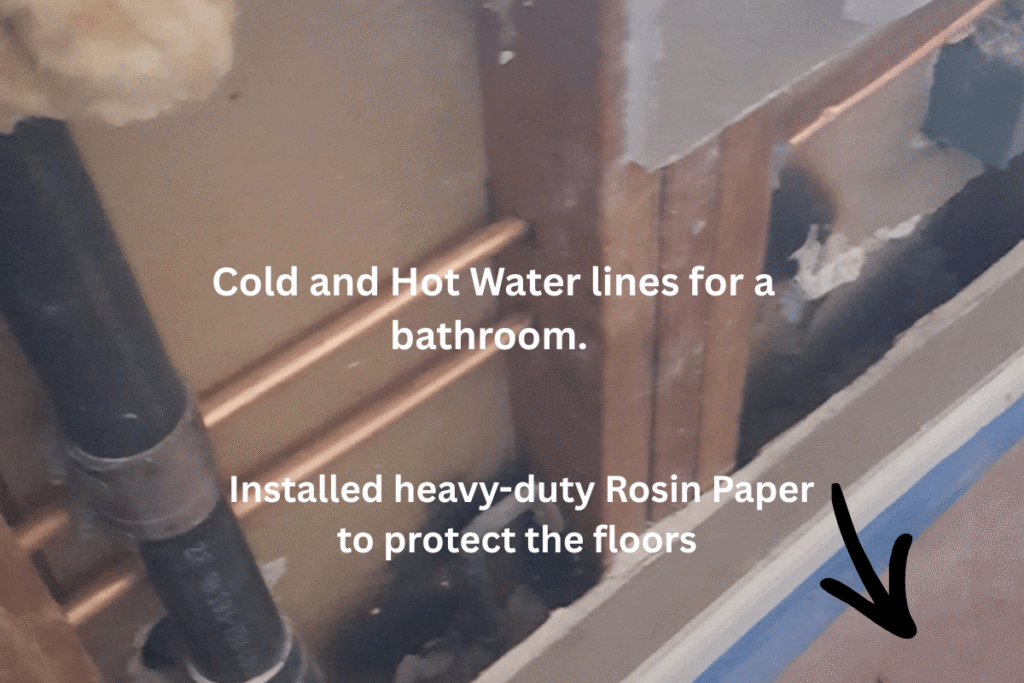
Copper repiping restores your plumbing system by replacing old, corroded, or leaking pipes with high-quality copper lines. Our service includes:
Full-home copper repiping
Replacement of aging Copper piping, Quest, or Pex pipong
Water line upgrades for better pressure
Hot & cold water line repipes
New shut-off valves & angle stops
Pipe rerouting for outdated systems
Wall access, patchwork, and cleanup included
We use only Type L and M copper piping, the industry standard for durability and long-term reliability.
Copper Repiping Service Areas
We gladly offer copper repiping services throughout:
American Plumbing Co. Service Areas.
San Diego (92101–92199), North Park, South Park, Golden Hill, City Heights, University Heights, Mission Hills, Clairemont, La Mesa, Allied Gardens, Rolando, Paradise Hills, Logan Heights, Sherman Heights, Normal Heights…and nearby communities.
SERVING SAN DIEGO SINCE 1983. WE HAVE DECADES OF EXPERIENCE
We Offer FREE Estimates.
Affordable, Honesty and Fairness.
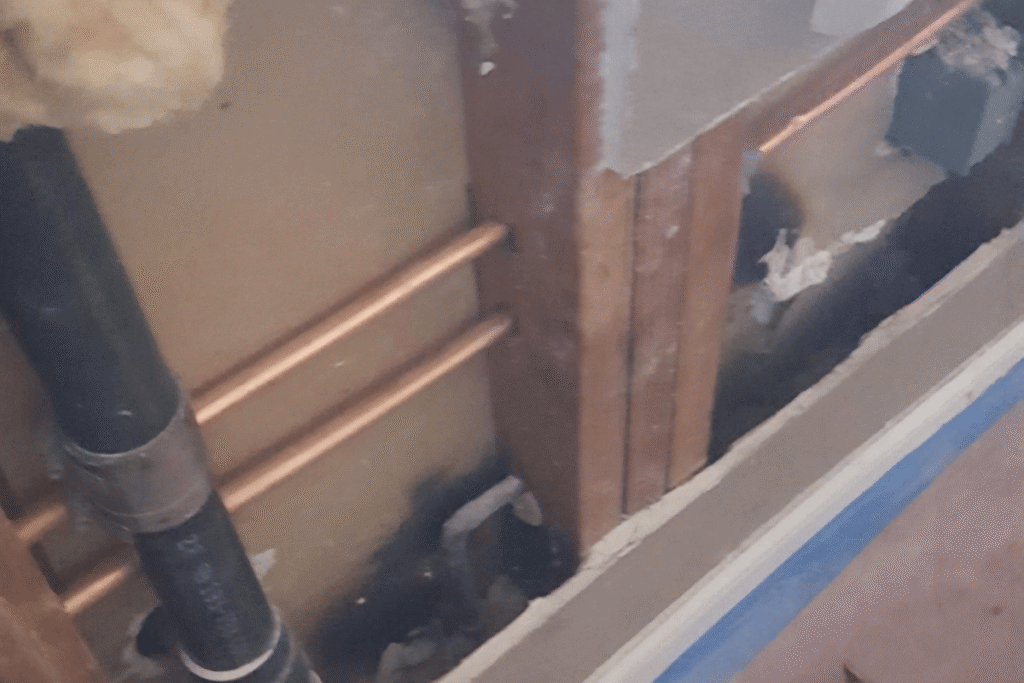
How Our Copper Repipe Works Start to Finish
When it’s time to repipe, precision matters. We don’t just rip out old pipes and replace them with copper; we follow a clean, efficient process designed to minimize disruption and maximize long-term performance. Here’s how a typical copper repipe works when you hire us in San Diego:
In-Home Inspection & Quote
We begin with a complete walkthrough of your plumbing system. Our team checks for visible pipe wear, the condition of shut-off valves, previous repairs, signs of slab leaks, and any DIY modifications that may impact the layout. Based on our findings, we provide a fixed, written quote with no upsells, hidden charges, or vague estimates.
Pipe Mapping & Planning
Once approved, we plan the repipe layout in detail. This includes determining wall access points, ceiling routes, fixture tie-ins, and methods for maintaining optimal pressure throughout the system. If we identify faulty toilet shut-offs, worn angle stops, or outdated water heater connections, we recommend replacing them during the same job to avoid future failures.
Site Prep & Protection
Before any work begins, we protect your home from damage. This includes papering floors, covering entryways, tarping furniture and electronics, and carefully cutting access panels with minimal drywall removal. Our goal is straightforward: to perform a complete copper repipe without leaving your home looking like a construction site.
Copper Installation
We install high-grade Type L and Type M copper throughout the home, using fully soldered joints at every connection. We never use compression fittings or push-to-connect shortcuts. Every line is pressure-tested once installed, ensuring system integrity before any seals are made.
Water On, Walls Patched
After testing, we restored the water service and confirmed the correct pressure and flow at every fixture. Then, we patch any wall openings we made, clean the site, and walk you through the whole system so you know exactly what was done and where. You're left with a fully repiped, leak-free, high-pressure copper system that's built to last.

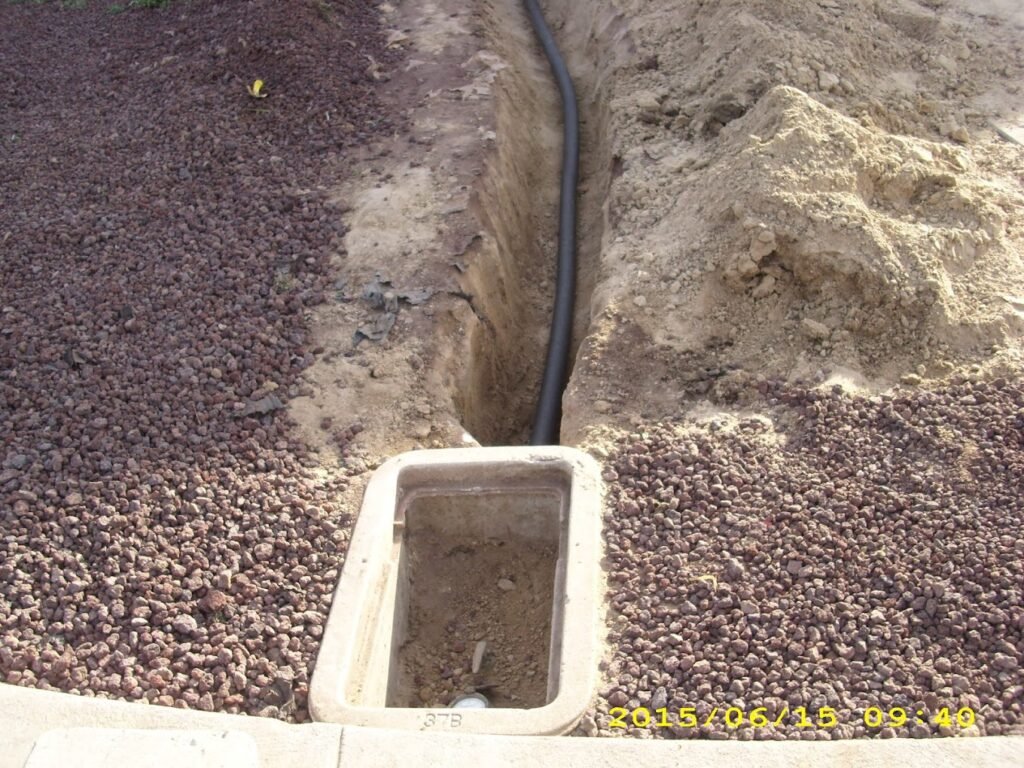
Copper vs PEX
Most San Diego homeowners are unaware of the type of piping running through their walls until a leak forces them to discover it. Here’s a clear breakdown of the three most common pipe types we find during repipe jobs and why copper wins every time:
PEX and Polybutylene:
Polybutylene: Installed from the 1980s to the early 2000s, these flexible plastic pipes fail at fittings and degrade when exposed to chlorine. We frequently encounter leaks in attics, walls, and behind fixtures, particularly in flipped homes and tract housing throughout Clairemont and La Mesa. Temporary repairs are common, but long-term reliability is poor.
Copper:
We install Type L and Type M copper piping, which is rigid, pressure-resistant, and non-reactive. It doesn’t scale, doesn’t corrode, and holds up for 50+ years. It’s the only material we use for full-home repipes in San Diego because it consistently outlasts plastic and steel, even under high-pressure, challenging water conditions.
Free Plumbing Estimates | San Diego’s Top Rated Local Plumber
At American Plumbing Co. | Plumber in San Diego, we gladly offer free estimates for copper repiping, plumbing repairs, and new-fixture installations.
Whether you’re dealing with a leak, low water pressure, a clogged drain, or need a complete system upgrade, we provide honest, upfront pricing with no hidden fees. You speak directly with a licensed plumber, not a call center, so you get accurate information and real professional guidance from the start. .
Why Homeowners Trust Us for Repipe Projects
San Diego has no shortage of plumbers offering copper repipes, but most of them subcontract the work or rush it to move on to the next job. We’re different. Here’s what sets our team apart and why hundreds of homeowners across San Diego County trust us to replace the pipes behind their walls:
- We Don't Sub Out the Work: Every copper repipe is handled by our licensed plumbers, not random contractors or temporary workers. You receive consistent quality from start to finish and have someone to call if you have questions.
- We use Type L and Type M Copper, Not Cheap Alternatives: We install both Type L and Type M copper piping, the industry standard for long-term durability and reliability. It resists corrosion, handles San Diego's water conditions, and outlasts thinner, lower-cost copper that some companies use to cut corners.
- Transparent Pricing, No Surprise Fees: Our repipe quotes are flat-rate and upfront. We don't charge extra for wall patching, additional fittings, or working on weekends. What you're quoted is what you'll pay — period.
- Clean Worksites, Respectful Crews: We treat your home as if it were our own. We cover floors, protect furniture, and clean up every day — not just when the job ends. Many of our customers tell us we left their homes cleaner than when we started.
- 5-Star Reviewed Across San Diego: From La Jolla to Lemon Grove, our copper repipe projects have earned top reviews for service, speed, and results. We don't just fix pipes — we protect your home, your time, and your trust.
Frequently Asked Questions – Copper Repiping
Q 1: . How do I know if my home needs a full repipe?
If you’re dealing with repeated leaks, discolored water, or low pressure, and your home was built before the 1990s, you’re likely due. Older homes in San Diego were built with under-the-slab copper or plastic piping that breaks down fast in our water conditions.
Q 2: Will I need to move out during the repipe?
Nope. We work in sections and restore water at the end of each day, so you can stay home while we work. Most full-home repipes take 2–3 days, depending on the size and layout.
Q 3: What if I’ve already repaired a few leaks? Do I still need a repipe?
Yes, if you’ve had more than one leak in the same system, more are likely to follow. A copper repipe costs less in the long run than repeated leak repairs, wall damage, and mold remediation.
Q 4: Can you also replace shut-off valves and water heater connections during the repipe?
Absolutely. We’ll replace failing toilet shut-offs, angle stops, and water heater lines as part of the job, ensuring your entire system is solid from the inlet to the fixtures.
Q 5: How long does a full copper repipe take?
Most single-family homes are completed in 1–2 days, depending on layout and size.
Q 7: Will copper repiping improve my water pressure?
Yes — replacing old galvanized lines greatly increases water pressure and flow.
Q 8: What type of copper do you use?
We use Type L copper, the industry standard for durability and long life.
Q 9: Do you repair walls after repiping?
Yes — wall access is patched and sealed as part of the service.
Q 10: How long does copper piping last?
High-quality copper piping can last 40–50+ years with proper installation.
Q 11: Should I replace all pipes at once or just sections?
A full repipe is the most reliable solution. Patching old piping leads to more leaks later.
